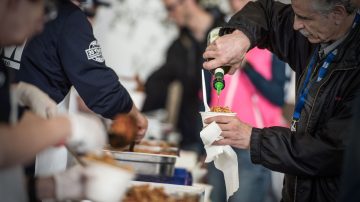You are constantly reading and hearing about carbo-loading and saltine diets, but what are the actually about? Should you conform your nutrition to your marathon? How does it work?
Talking about the classical dieting carbo-loading is part of it before a marathon or conditional training. It is also known since 1967 and was developed under this method as the saltine diet or (“the Swedish diet”). The principle behind it, is that by emptying the muscle glycogen reserves, the glycogen synthesis is improved and with this you can use the glycogen reserves longer by marathons. Through this, the saltine diet as nutritional and training intervention is diverted and becomes a detrimental part in maximizing the muscle glycogen reserves. The saltine diet is still used as a variation of carbo-loading, that means it is used to maximize the glycogen reserves. It is important for the athletes to take a strong intervention in the normal eating and trainings routines shortly before the competition. At least from a psychological standpoint this is anything but advantageous. Next to the principle, the Swedish variation overtakes the method from the early 80s, the Sherman method in which carbo-loading was tapered. In comparison to the Swedish diet, in which you prepare for a very intensive training for the sole purpose of reducing the muscle glycogen reserves – 3 days without a stress at the same time little amounts of carbohydrates, as well as 3 days with a high amount of carbohydrates without a workload follows, this is done when tapering in step-for-step method over one week and then reduced. With this the Swedish diet proves through nutritional intervention – 3 days very little carbohydrate diet (15 energy-%) afterwards, 3 days a high amount of carbohydrates (70 energy-%)-regarding the maximization of the muscle glycogen reserves as an intervention on par with 3 days of intaking enough carbohydrates (50 energy-%, which is the normal dieting method) and then 3 days later upping it up to (70 energy-%). That is why the tapering intervention with the beginning of carbohydrate intake at a moderate level was promoted as a valid alternative for the Swedish diet, because you don’t have to go deeper into the nutrition as other athletes. At the start of around 2000 an alternative method was suggested to maximize the glycogen reserves. Since then, surprisingly it was not researched, if filling up the glycogen reserves 3 days beforehand with a carbohydrate loaded diet is necessary or if the short phase of carbo-loading is necessary. Even though the Australian scientist Paul Fournier showed us in 2002, that days with an extreme amount of carbohydrates (10 g/kg bodyweight) is enough, to maximize the reserves, but this method has not been used enough, the question is why? Because in this sports study athletes took part in a highly intensive interval training to empty out the glycogen reserves. This is not suggested 48 hours before a competition. It is then imperative, that the glycogen reserve is refilled within 24 hours.
What should the starters take into consideration one week before the marathon?
- reduce the carbohydrate intake an Tuesday and train so that your glycogen reserves are used (high intensity, non-variation)
- Wednesdays another trainings session to use up the glycogen reserves and continue the carbohydrate reduction (training only with the anaerobic levels). WARNING: You may feel exhausted, since you have not filled up your glycogen reserves, this is normal and this is what you want.
- Starting on Thursday, it’s time to fill up the glycogen reserves with carbohydrate-rich meals (10 g/kg bodyweight). This is only possible if you are eating low-fat on this day.
- Friday and Saturday continue with the carbohydrate-rich dieting.
- Sunday, you should have filled up the maximum muscle glycogen reserves and nothing should stand in your way for the marathon!
Practice tips:
100g noodles (weighed raw) 69,9 g carbohydrates
100g baguette 55,4 g carbohydrates
100g lye roll 45,3 g carbohydrates
100g mixed wheat bread 47,7 g carbohydrates
100g wheat bread 48 g carbohydrates
100g oats 58,7 g carbohydrates
100g rice (weighed raw) 77,7 g carbohydrates
100g potatoes 14,8 g carbohydrates
100g sweet potatoes 24,1 g carbohydrates
100g Amaranth 56,8 g carbohydrates
100g Quinoa 58,5 g carbohydrates
100g banana 20 g carbohydrates
100g apple 11,4 g carbohydrates
100g pear 12,4 g carbohydrates
(source general nutritional table)























